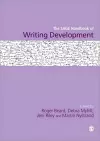
The SAGE Handbook of Writing Development
4 contributors - Hardback
£150.00
I taught in primary schools, a college of higher education and at Leeds University before becoming Professor of Primary Education at the Institute of Education, where I was Head of the Department of Early Childhood and Primary Education 2005-2010. My particular interests are literacy and teachereducation. Debra Myhill is Professor of Education at the University of Exeter, UK, and Director of the Centre for Research in Writing, which promotes inter-disciplinary research, drawing on psychological, socio-cultural and linguistic perspectives on writing. Her research interests focus principally on writing and the teaching of writing, particularly linguistic and metalinguistic development, the composing processes involved in writing, the talk-writing relationship, and creative writing. Underpinning this research is the principle that literacy, especially writing, is a pathway to empowerment. Over the past twenty years, she has led a series of research projects in these areas, in both primary and secondary schools. Key Publications Chen, H. Myhill, D. A and Lewis, H. (2020) Developing writers across primary and secondary years: Growing into Writing. London: Routledge Jeni Riley is Head of School of Early Childhood and Primary Education at the Institute of Education, University of London. Martin Nystrand (Ph.D., Northwestern University) is LOUISE DURHAM MEAD PROFESSOR OF ENGLISH at the University of Wisconsin-Madison. His research focuses on the dialogic organization of discourse in both writing and classroom discourse. His writing research examines how writing-reader interaction shapes the writer’s writing process and development: The Structure of Written Communication: Studies in Reciprocity Between Writers and Readers (Academic Press, 1986). His classroom discourse research, in collaboration with Adam Gamoran, probes the role of classroom interaction in student learning and was the first empirical study to document the role of open classroom discussion in student learning: Opening Dialogue: Understanding the Dynamics of Language and Learning in the English Classroom (Teachers College Press, 1997). His study, “Questions in Time: Investigating the Structure and Dynamics of Unfolding Classroom Discourse” (with L. Wu, A. Gamoran, S. Zeiser, D. Long, Discourse Processes, 35 (2003), 135-196) is the first-ever use of event-history analysis to investigate classroom discourse. Nystrand is a former director of the National Research Center on English Learning & Achievement (CELA), editor of Written Communication, and president of both the National Conference on Research in Language and Literacy (NCRLL) and the American Education Research Association (AERA) Special Interest Group (SIG) for Writing Research. At Wisconsin, he has also been a Vilas Associate and, since 1994, a member of the Teaching Academy. He teaches undergraduate courses in composition and English education and graduate courses and seminars in Composition and Rhetoric, a program he chairs. His most recent book, coedited with John Duffy, is Towards a Rhetoric of Everyday Life: New Directions in Research on Writing, Text, and Discourse (University of Wisconsin Press, 2003). He is currently working on The Semiotics of Influence, a sociocultural history of composition studies investigating the history and social context of empirical writing research as it unfolded in North America during the 1970s & ’80s.